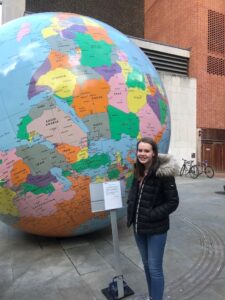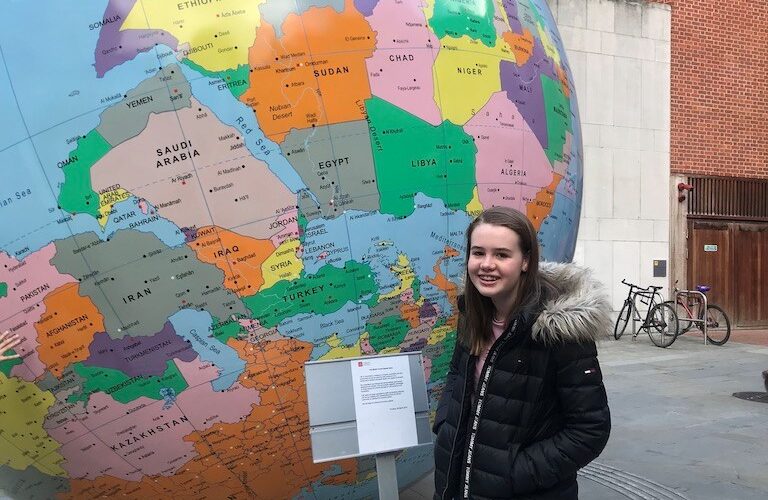In the next of our ongoing series where our recent alumni share their experience of post-18 applications, as well as giving advice to current students, we hear from Jen and Matthew, who left CHS in 2020 and are moving on to study Economics at Manchester and UEA respectively. Following their outstanding A Level achievements, both students have been awarded scholarships from their chosen universities.
Jen and Matthew studied A Level Economics at Crompton House, with Jen choosing History and Maths, while Matthew studied Business and Politics. Both completed EPQs for which they were awarded A* grades; Matthew focused on how the barriers to pilot training are likely to result in a shortage of commercial pilots in the future and Jen studied whether classical philosophers’ views on deterrence theory could be applied to capital crimes.
Why did you choose to study Economics at degree level?
Jen: I chose to study Economics at degree level because it was my favourite A Level course and something which I really enjoyed not only studying but reading around in my spare time. I just really love the subject’s engagement of current world affairs and want to further develop my understanding of the subject and the world around me.
Matthew: I chose Economics because it was I really enjoyed the subject at A Level and it was one of my strengths. The most important reason however is that, because I am unsure want I want to do for a career in the future, Economics is a very flexible degree that keeps many doors open and is also incredibly valued by employers.
How did you choose between BA and BSc Economics?
Matthew: I was limited in choice of university as most require Maths A Level to do the BSc. However my university – University of East Anglia – prides themselves on taking non A Level Maths students to do the BSc course. This gave me a lot of confidence in their course delivery.
Jen: My decision to study BSc Economics was a difficult one, which is why I applied for both courses at Manchester. I really liked the amount of choice and freedom the BA course offered, such as the ability to take modules in geography, history, politics and other social sciences, however I just felt the BSc was a better fit for me. With the BSc, I still got some of the choice the BA course offered but also the ‘mathsy’ side of Economics. In my research for the Manchester Access Programme Academic Assignment and my EPQ I had come across models which tested hypotheses and forecasted future trends which were really fascinating and is certainly something I want to learn more about. For that reason, I just felt the BSc course offered the best of both worlds for me.

Jen visited her shortlisted universities to help her decision making. This sculpture (Mark Wallinger’s The World Turned Upside Down) is at the London School of Economics.
How did you choose the university you wanted to study at?
Jen: When I first started looking at what universities to apply to, I used UCAS to find what universities offered the course I was interested in and looked at the grade entry requirements. From that I looked at individual university websites, keeping my eye out for certain modules I liked the sound of and also the opportunities the university had on offer, such as years abroad and summer internship programmes.
After my research I had a list of about 6 or 7 universities I was interested in and attended the open days of my favourites, such as Manchester and LSE. I also attended some different events, such as a small group tutorial at Oxford, and Manchester Access events. Smaller events like these that universities held, helped to give me a better insight into what life would be like at those universities.
After I had attended all these events I reviewed how I had ranked my choices and decided some weren’t right for me: this was mainly based off how comfortable I felt at the university and sometimes, sadly, the very expensive costs of living. In the end I decided Manchester was my number one choice because it meant I could live at home but still get a degree that offered everything I wanted.
Matthew: I was limited by the pool of universities due to my A Level choices, however it was very clear that whilst UEA is not a Russell Group university, it still has an excellent reputation. I also really liked the campus, something that some of the big city centre universities don’t have, and they offered the BSc which I really wanted.
Did you do any work experience related to your application? How did this help?
Matthew: I didn’t have any specific work experience, however my work experience in Year 12 was at a company called Key Travel Ltd. I did this in order to see a how a medium-sized business runs its day to day operations, and while I was there I spent time with all the different departments. During this time, I got the opportunity to sit on a board meeting and also and afternoon with the Chief Financial Officer. This is a job I found fascinating and could see myself doing. With a bit of research, I found that many holders of this job have an Economics degree.
Jen: Something which really helped my university application was the Manchester Access Programme (MAP). During my MAP, I had to attend events at the university, including a research and reference workshop, strategies for learning workshop and the University Life Conference. I also completed an academic assignment, where I was paired with two researchers, specialising in Economics, who gave me advice on how to plan and structure my essay, as well as help in finding appropriate source material. All of these things gave me something to talk about in my personal statement, especially the academic assignment.
One of the main benefits of MAP was the lower grade entry requirements to study at Manchester and the Decision Manchester Programme. By being able to submit my personal statement for Decision Manchester before I submitted it on UCAS, I was able to find out which course(s) I would receive an interview or offer for at Manchester as well as receiving feedback on my personal statement from admissions tutors. This meant I had confidence that I would get at least one offer when I submitted my UCAS form.
What advice would you give to students planning to apply for Economics?
Jen: I would say take every opportunity you can, attend talks on the subject, extend your knowledge with an EPQ, and enter competitions. For example in class we wrote entries for the Winston Churchill Sixth Form Prize for Economics, where we had to predict the £ to € exchange rate on the 1st June 2019, some 30+ days after entries had to be submitted. [Jen achieved a Highly Commended award in the competition, predicting the exchange rate to within £0.0018!] Also, watch documentaries and read around specific things you find interesting in class, for me this was looking at Economic History (particularly hyperinflation crises) and Keynesian and Monetarist ideologies.
By doing these things, you are able to see whether you really do have a passion for the subject and should continue your studies of Economics. It also means you have plenty to talk about in your personal statement.
Matthew: As Economics is so broad, try and separate in your head which topics you like and which you don’t. This will help determine whether to apply for the BA or BSc, and also which university you want to apply to as the modules might be different at each one. If you haven’t done A Level Economics, you can still do an Economics degree, but it will help you to do some reading around the subject to get a better understanding of what you are going in to.
What should future applicants think about when writing their personal statement?
Matthew: Economics as a degree is highly valued. It is highly valued because it develops many skills such as thinking like an Economist, being able to deal with qualitative and quantitative data the list is endless. All this needs to be considered when talking about yourself. This degree is takes a lot of hard work and universities are looking for people that will stick it out and not give up when things get tough – which at some point they will! This in my opinion is what the statement should be centred around with evidence to support that you are a hard worker and suitable for the degree.
Jen: Tell the universities how are amazing you are to convince them that you are the right fit for them. Instead of saying ‘I am passionate about Economics’ show that you are passionate by talking about all the things you have done, how they have benefited you and any conclusions you have made.
What are you looking forward to when you get to university?
Jen: I am looking forward meeting new people who share the same passions for the subject I love, and furthering my understanding of Economics, especially when now is such an interesting time to study the subject, with regards to the economic and political uncertainty we are facing.
Matthew: Meeting completely different people, especially as I am going so far away from home. Some new opportunities and experiences to help me develop as a person.
We wish them both the very best as they start the next steps in their paths and, as with all our alumni, look forward to hearing how they get on in the future.





Leave a Reply